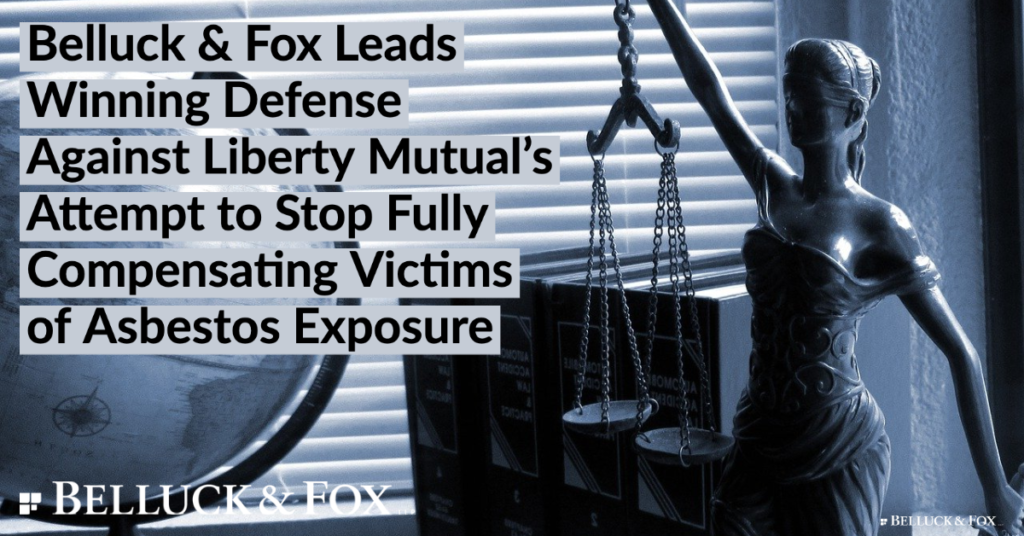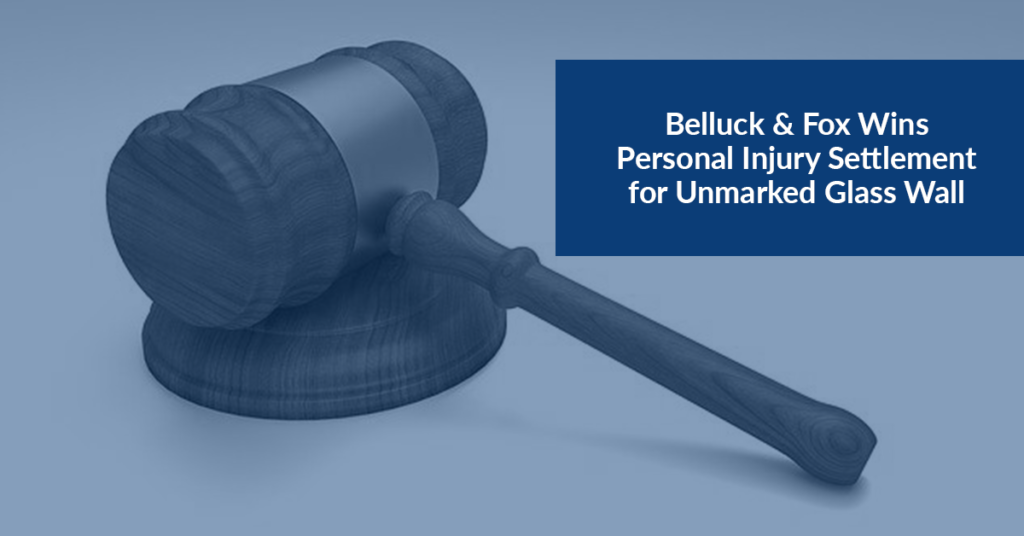Belluck Law Leads Winning Defense Against Liberty Mutual’s Attempt to Stop Fully Compensating Victims of Asbestos Exposure

On June 17, 2021, New York County Supreme Court Judge, Hon. Arthur F. Engoron, delivered a decision in Liberty Mut. Ins. Co. v. Jenkins Bros., et al., Index No. 651980/2018 (New York County) that is sure to be applauded by injured tort victims across New York state.
The case involves Jenkins Bros., a former manufacturer of industrial valves containing various asbestos components which were widely used throughout the world. In the 1980s, the company fell on hard times, entered Chapter 7 liquidation, and was for all intents and purposes defunct by 1989. The State of New Jersey, its state of incorporation, administratively dissolved the company in 2004 for failure to pay taxes.
By the early 2010s, Jenkins Bros. was named as a defendant in numerous lawsuits brought by Belluck Law, LLP on behalf of victims of asbestos, who sought to serve Jenkins Bros. by way of substituted service directly on the defendant’s longtime liability insurer, Liberty Mutual Insurance Company. Liberty Mutual intervened in the action and attempted to argue that because Jenkins Bros. was dissolved, it could no longer be sued. The trial court, however, disagreed with Liberty Mutual and accepted Belluck Law’s position, on behalf of its clients, that Liberty Mutual was the real party-in-interest. Liberty Mutual was intent on appealing, but the Appellate Division, First Department also rejected Liberty Mutual’s contentions, finding that the New Jersey dissolution statute permitted Jenkins Bros. to be sued in perpetuity.
Moreover, the First Department affirmed the trial court’s reasoning that Liberty Mutual, as Jenkins Bros.’ liability insurer, was the “real party-in-interest.” Germain v. A.O. Smith Water Prod. Co., 41 Misc. 3d 1228(A) (Sup. Ct. 2013), aff’d sub nom. In re New York City Asbestos Litig., 116 A.D.3d 571, 984 N.Y.S.2d 335 (1st Dept. 2014). Liberty Mutual then asked New York’s highest court to review the case, but that request, which was opposed by Belluck Law, was denied.
For several years thereafter, Liberty Mutual controlled the defense of Jenkins Bros. in these asbestos lawsuits and paid numerous settlements out of its policies. These settlements were always fully funded by Liberty Mutual.
In 2014, however, Liberty Mutual entered into a series of complicated transactions with Berkshire Hathaway in order to get Liberty Mutual’s legacy asbestos liabilities off its books. In particular, Liberty Mutual entered into “retroactive reinsurance treaties” with National Indemnity Company (“NICO”), a Berkshire Hathaway entity.
As part of this arrangement, Liberty Mutual paid a multi-billion dollar “premium” to NICO in exchange for NICO reinsuring its asbestos and other “long-tail” insurance liabilities while another Berkshire Hathaway entity, Resolute Management, Inc. (“Resolute”) took over the handling of Liberty Mutual’s asbestos claims. In this type of transaction, the reinsuring entity “covers its bet” by reinvesting the premium it receives and by limiting or delaying payments to injured tort victims.
Sure enough, after taking over from Liberty Mutual, Resolute took steps to avoid Liberty Mutual’s obligation to indemnify Jenkins Bros. for settlements it had previously agreed to, and to which New York courts had already concluded that Liberty Mutual was the real party-in-interest. Specifically, Liberty Mutual stopped paying the full amount of each settlement its appointed attorneys entered into with injured tort victims. Resolute reasoned that Jenkins Bros. itself—despite being defunct— should have to pay a share of these settlements, which it referred to as an “orphan share.” And since Jenkins Bros. has no non-insurance assets, practically speaking, this would have required injured tort victims to receive only a percentage of the settlements they had reached with the attorneys Liberty Mutual had appointed to represent Jenkins Bros. Resolute took this position despite there being no change in the law or the facts of any particular case; it was simply an internal decision to change course and no longer pay tort victims the amounts agreed upon in settlement.
In 2018, Liberty Mutual even went so far as to sue Jenkins Bros. (the defunct company it controlled) and several individual injured tort victims who either were terminally ill or already deceased, seeking judicial approval of this newly-derived “orphan share” practice. Although many different law firms representing asbestos victims were involved, the defense of this action was spearheaded by Belluck Law.
In reaching a decision on summary judgment motions, Judge Engoron correctly rejected Liberty Mutual’s arguments regarding “orphan shares.” In particular, the Court found that Liberty Mutual was estopped from paying less than the full amount of the settlements Liberty Mutual itself negotiated with the injured tort victims. The court also rightly pointed out that the legal and policy underpinnings of Resolute’s “orphan share” theory, i.e. that the policyholder should have to bear the consequences of its “decision” to “self-insure,” only applied to legal disputes between policyholders and insurance companies, not insurance companies and tort victims. Therefore, as the “real party-in-interest,” Liberty Mutual was required to fund 100% of the settlements it had reached with the tort victims it had sued.




